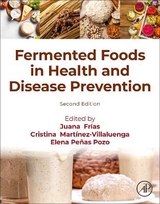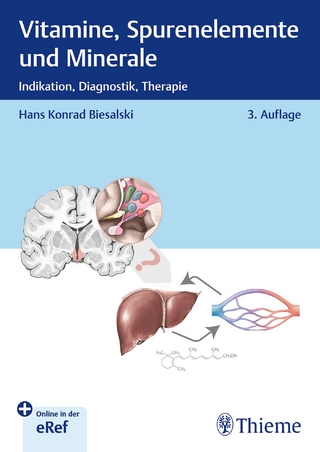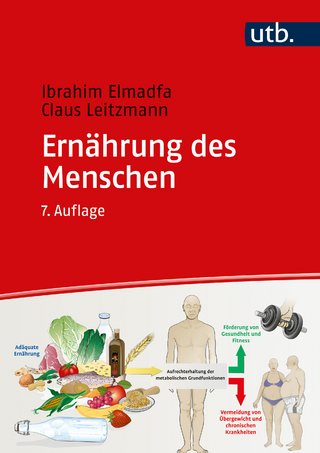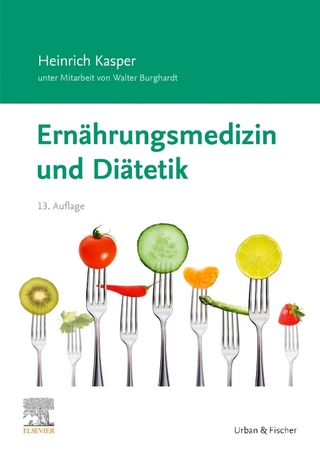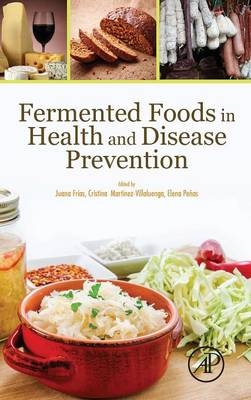
Fermented Foods in Health and Disease Prevention
Academic Press Inc (Verlag)
978-0-12-802309-9 (ISBN)
- Titel erscheint in neuer Auflage
- Artikel merken
Coverage in the book includes the role of microorganisms that are involved in the fermentation of bioactive and potentially toxic compounds, their contribution to health-promoting properties, and the safety of traditional fermented foods. Authored by worldwide scientists and researchers, this book provides the food industry with new insights on the development of value-added fermented foods products, while also presenting nutritionists and dieticians with a useful resource to help them develop strategies to assist in the prevention of disease or to slow its onset and severity.
Juana Frias BSc, PhD is a Senior Research Scientist of the Spanish National Research Council (CSIC). She currently heads a team at the Institute of Food Science Technology and Nutrition, Madrid, Spain, carrying out research on the production and characterization of biologically active ingredients from plant food origin. Dr. Frias graduated in 1987 with an Honours Degree in Pharmacy Sciences and gained her PhD in 1992 with extraordinary award at University of Alcalá de Henares (Spain). In 2009, Dr. Frias became a Fellow of the Food Chemistry Division working party within the European Association for Chemical and Molecular Sciences (EuCheMS). In her career Dr. Frias has carried out research at the Food Research Institute and John Innes Institute (Norwich, UK), University of Life Sciences (Copenhagen, DK) and the Institute of Industrial Fermentation, CSIC (Madrid, ES). She has collaborated with research groups in Poland, United Kingdom, Finland, Denmark, Italy, Venezuela, Argentina, Peru, and USA. She is a leading expert on the grain legumes and their biotechnological processing to enhance nutritional and biofunctional properties and has a long standing interest in how functional ingredients affects health. Dr. Frias has published over 120 peer-reviewed manuscripts based on original research, has participated in national and international research projects, supervised Master students, PhD fellows and national and international research visitors. Cristina Martinez-Villaluenga is a senior scientist and member of the GRAINS4HEALTH research group at the Institute of Food Science, Technology, and Nutrition (ICTAN) of the Spanish National Research Council (CSIC). The mission of her research group is to develop new added-value products from grains (cereals, pseudocereals, and legumes) and give solutions to meet consumer and producer demands for food quality and safety, sustainability, and health. Bioactive compounds (including proteins and peptides) are the focus of her research. She has been involved in numerous Spanish, European, and International research projects. Elena Peñas BSc, PhD is a Research Scientist of the Institute of Food Science and Nutrition (ICTAN), Madrid, Spain, belonging to the Spanish National Research Council (CSIC). Her main research interests are aimed to develop and validate technological bioprocesses for improving the safety, quality and bioactivity of plant foods. A key part of her research activities is focused on the evaluation of the allergenic potential and health implications of novel bioactive food ingredients. Dr. Peñas obtained her bachelor’s degree in Biology in 2000 at Complutense University of Madrid and her PhD in 2006 at Autonoma University of Madrid (Spain). Dr. Peñas has performed her research career in different renowned European Research Institutions such as Institute of Instituto del Frio (Spain), Institute of Industrial Fermentations (Spain), Nizo Food Research (the Netherlands), University of Milan (Italy) and MTT Agrifood Research (Finland). Dr. Peñas is author of more than 40 peerreviewed articles and 4 book chapters, and she has participated in several research projects funded by National and International Public Institutions and private companies. She has given many invited lectures at University of Milan and has served as a mentor of undergraduate and graduate students and international researchers visitors.
Section 1. Introduction 1. Fermented Foods in Health Promotion and Disease Prevention: An Overview
Section 2. Fermented Foods as a Source of Healthy Constituents 2. Bioactive Peptides in Fermented Foods: Production and Evidence for Health Effects 3. Health Benefits of Exopolysaccharides in Fermented Foods 4. Biotransformation of Phenolics by Lactobacillus plantarum in Fermented Foods 5. Gamma-Aminobutyric Acid-Enriched Fermented Foods 6. Melatonin Synthesis in Fermented Foods 7. Effect of Fermentation on Vitamin Content in Food 8. From Bacterial Genomics to Human Health
Section 3. Traditional Fermented Foods Section 3.1. Fermented Food of Animal Origin 9. Fermented Seafood Products and Health 10. Fermented Meat Sausage Section 3.2. Dairy Fermented Foods 11. Health Effects of Cheese Components with a Focus on Bioactive Peptides 12. Blue Cheese: Microbiota and Fungal Metabolites 13. Yogurt and Health 14. Kefir Section 3.3. Legume and Cereal Grains Fermented Derived Products 15. Beer and Its Role in Human Health 16. Fermented Pulses in Nutrition and Health Promotion 17. Nonwheat Cereal-Fermented-Derived Products 18. Use of Sourdough Fermentation and Nonwheat Flours for Enhancing Nutritional and Healthy Properties of Wheat-Based Foods 19. Tempeh and Other Fermented Soybean Products Rich in Isoflavones Section 3.4. Vegetables and Fruits Fermented Products 20. Kimchi and Its Health Benefits 21. The Naturally Fermented Sour Pickled Cucumbers 22. Role of Natural Fermented Olives in Health and Disease 23. Pulque 24. Sauerkraut: Production, Composition, and Health Benefits 25. Vinegars and Other Fermented Condiments 26. Wine
Section 4. Hazardous Compounds and Their Implications in Fermented Foods 27. Biogenic Amines in Fermented Foods and Health Implications 28. Occurrence of Aflatoxins in Fermented Food Products 29. Antibiotic Resistance Profile of Microbes From Traditional Fermented Foods
Section 5. Revalorization of Food Wastes by Fermentation into Derived Outcomes 30. Fermentation of Food Wastes for Generation of Nutraceuticals and Supplements
| Erscheinungsdatum | 28.09.2016 |
|---|---|
| Verlagsort | San Diego |
| Sprache | englisch |
| Maße | 152 x 229 mm |
| Gewicht | 1360 g |
| Themenwelt | Medizin / Pharmazie ► Gesundheitsfachberufe ► Diätassistenz / Ernährungsberatung |
| Medizin / Pharmazie ► Medizinische Fachgebiete ► Medizinethik | |
| ISBN-10 | 0-12-802309-0 / 0128023090 |
| ISBN-13 | 978-0-12-802309-9 / 9780128023099 |
| Zustand | Neuware |
| Informationen gemäß Produktsicherheitsverordnung (GPSR) | |
| Haben Sie eine Frage zum Produkt? |
aus dem Bereich
